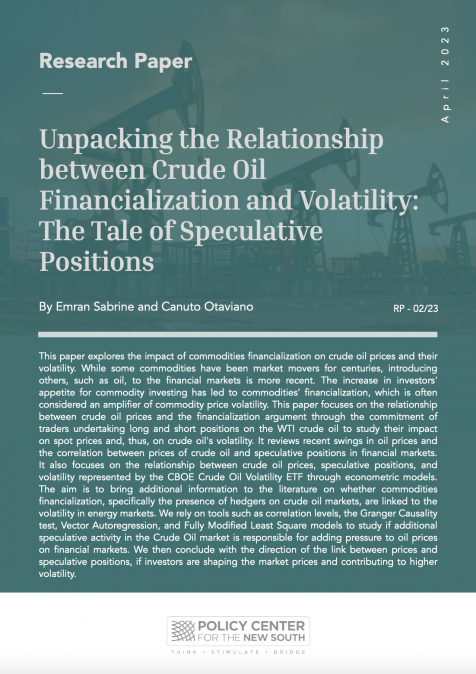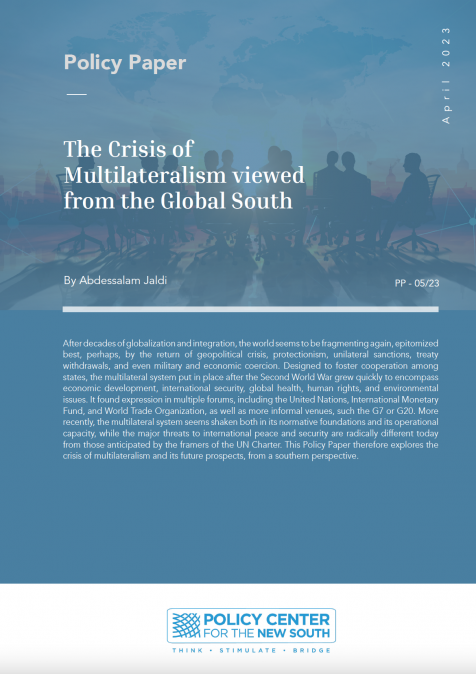Paul-Simon Handy, Regional Director for East Africa and Representative to the African Union, delves into the complexities of mediation in internal African conflicts. Despite half of the UN peacekeeping forces being deployed on the African continent, sustainable peace remains elusive. Mr Handy explores the reasons behind these challenges, shedding light on the intricate dynamics and obstacles that hinder effective conflict resolution.
RELATED CONTENT
-
AuthorsMay 3, 2023For over six decades, Morocco has largely equated the achievement of food self-sufficiency (FSS) in ‘strategic’ food commodities to achieving food security. Successive governments have succeeded in guaranteeing the availability of and access to these commodities for the poor and vulnerable. In so doing, they have maintained social stability by fulfilling a basic social contract with the people. This is a major achievement, but the financial, economic, and environmental costs of this ...
-
Imane Lahrich & Mohammed LoulichkiMay 02, 2023بمناسبة اليوم الدولي للتعددية والدبلوماسية من أجل السلام، قررنا تخصيص الحلقة إلى إفريقيا ومبدأ تعددية الاطراف في سياق اوضاع السلم والأمن الهشة في منطقة الساحل وانتشار عدم الاستقرار في الب ...
-
May 2, 2023على ضوء الاجتماعات السنوية لمجموعة البنك الدولي وصندوق النقد الدولي في التقرير الأخير لصندوق النقد الدولي حول آفاق الاقتصاد العالمي، والذي يطبعه القلق الزائد في ظل اضطرابات القطاع المالي والتضخم المتزايد والآثار المستمرة للاجتياح الروسي لأوكرانيا، بالإضافة إلى العواقب الاقتصادية الم...
-
AuthorsApril 28, 2023This paper explores the impact of commodities financialization on crude oil prices and their volatility. While some commodities have been market movers for centuries, introducing others, such as oil, to the financial markets is more recent. The increase in investors' appetite for commodity investing has led to commodities’ financialization, which is often considered an amplifier of commodity price volatility. This paper focuses on the relationship between crude oil prices and the fi ...
-
Youssef El Jai & Mark AspinwallApril 28, 2023In this podcast, we explore the issue of sustainability in the Global South as it pertains to the energy transition and the challenges faced in implementing policies. Drawing on Professor ...
-
AuthorsApril 27, 2023Recent initiatives and policy moves by China and other countries to extend the reach of use of the renminbi in the international monetary system, while the U.S. dollar share in global reserves has slightly shrunk in relative terms, have sparked frequent discussions about a hypothetical “de-dollarization” of the global economy. We approach here what that would mean in terms of global currency functions as means of payment and store of value. While we point out a relative decline of ...
-
AuthorsApril 26, 2023It is estimated that $1 trillion to $6 trillion per year (up to 2050) needs to be invested globally if the world is to stay below the 2°C global warming ceiling of the Paris Agreement and to meet its adaptation goals. Currently, investments stand at about $630 billion per year, way below the original target. And although great efforts have been made in the climate-finance area, more than 70% of the funds deployed have gone to one sector, renewable energy, followed by the transportat ...
-
April 25, 2023بمناسبة اليوم الدولي للتعددية والدبلوماسية من أجل السلام، قررنا تخصيص الحلقة إلى إفريقيا ومبدأ تعددية الاطراف في سياق اوضاع السلم والأمن الهشة في منطقة الساحل وانتشار عدم الاستقرار في البحيرات الافريقية الكبرى، بالإضافة إلى عجز مجلس الأمن التابع للأمم المتحدة عن مواجهة الحرب المستمرة ال...
-
Imane Lahrich & Raja BensaoudApril 25, 2023يعتبر الحق في الحصول على المعلومات إحدى آليات الشفافية وتيسير الرقابة على السياسات العمومية والمشاركة في الحياة العامة، باعتباره حقا مدنيا وسياسيا نادت به كل المواثيق الدولية. وبالرجوع إل ...
-
AuthorsApril 24, 2023After decades of globalization and integration, the world seems to be fragmenting again, epitomized best, perhaps, by the return of geopolitical crisis, protectionism, unilateral sanctions, treaty withdrawals, and even military and economic coercion. Designed to foster cooperation among states, the multilateral system put in place after the Second World War grew quickly to encompass economic development, international security, global health, human rights, and environmental issues. ...








